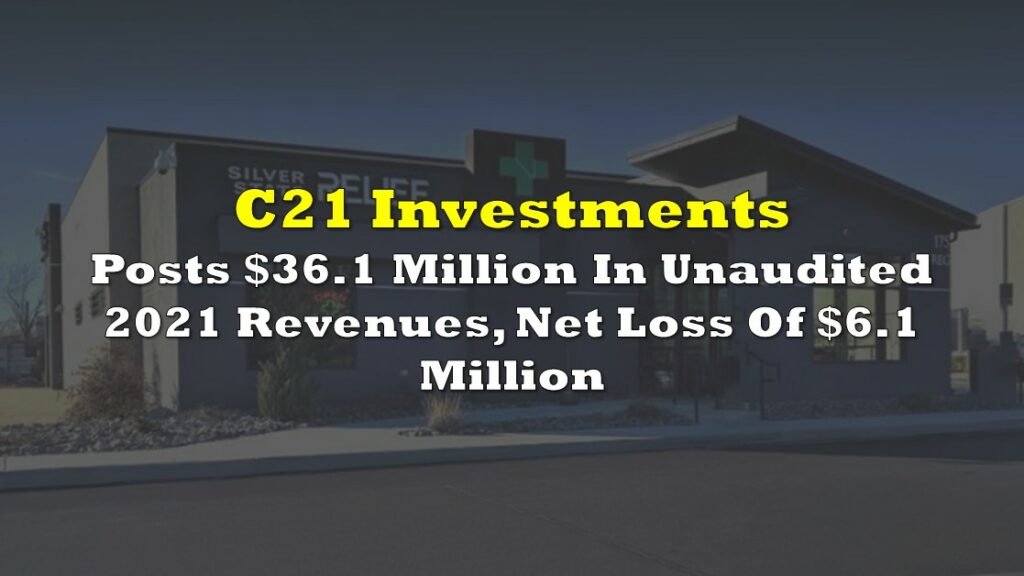C21 Investments (CSE: CXXI) has been a curious case for the US cannabis sector. While its well known among the retail investor community as being pushed in mid-2019 by a less than honest Twitter account that has now disappeared off the face of the earth, it’s not known by investors for the operational success its seen in a tough sector.

To be clear, there remains some issues with that of C21, similar to any listed cannabis entity. First, the firm took a writedown of $4.5 million on its Oregon assets within the last reporting period as a result of an independent appraisal on the leasehold and real estate assets.
However, this can arguably be viewed as favourable, in that the company addressed some figures that did not accurately reflect the value of the firms assets, and they corrected the issue rather quickly. The alternative, is the combined $930 – $1.0 billion that Aurora Cannabis will now be writing down in the next quarter as a result of not being prudent on managing its asset values and overpaying for acquisition targets.

Second, is the largest issue facing that of C21 – the debt owed to the company’s CEO Sonny Newman. C21’s flagship Nevada properties, known as Silver State Relief/Cultivation, were purchased from Newman in January 2019 for a total sum of US$39 million, as well as the issuance of 12.5 million common shares of the issuer. Of the $39 million, $30 million came in the form of a promissory note, which has since been renegotiated a number of times.
As of the last financial filing, $21.8 million was stilled owed to Newman, who is now the Chief Executive of the firm. The debt, due July 1, 2020, bears interest at a revised rate of 9.5%, and as of January 1, the company is required to pay $600,000 per month towards this debt. The result, is that on July 1, C21 will still owe an estimated US$18.2 million at the time of maturity of the note. This can certainly be viewed as problematic – the firms largest creditor is that of the CEO of himself, which can certainly create some conflicts of interest, and is by and large the biggest, and one of the only, issues with that of C21.
To be fair to Sonny however, he has continuously worked with the company to amend the terms of the payback of this debt. At one point, the firm was to pay $2.0 million per month starting January 1, 2020, but that has since been revised down to better suit the public company. The interest rate has also been reduced, despite the reduced payments, demonstrating that he is willing to work with the company and its shareholders to find common ground. While the most reassuring move Newman could make is to take the value of the debt in the form of common shares, this is arguably one of the better alternatives, and we suspect that the debt maturity will likely be pushed out in the months to come.

Setting aside the debt owed to Sonny, C21 has been a bit of a rarity in terms of operational performance. As of the nine months ended October 31, 2019, the firm has generated revenues of US$28.1 million, with gross profits before biological adjustments of $12.1 million. The full year thus far has seen a loss of $11.2 million, which was impacted to the tune of $4.1 million as a result of the aforementioned writedowns. Excluding non-cash items, the most recent quarter actually saw a slight income of $1.0 million on $10.5 million in gross revenues.
In terms of cash flow, C21 has had net positive operational cash flow for the current fiscal year, with $3.1 million in cash flow being generated. Of that, the most recent quarter saw the most significant increase in operational cash flow, with the quarter contributing $2.2 million in positive cash flow. As a result of net negative investing cash flow due to acquisitions over the fiscal year, the company has seen negative cash flows overall for the current year of $7.0 million.
It should also be noted here that the company is doing a decent job of servicing their current debt as well. Although the firm paid out $2.5 million servicing its debt in the third quarter, the overall cash position, as a result of the positive operational cash flow of the firm, decreased by slightly more than $700,000 during the quarter with no financing cash inflows.
Something else to consider is the steady revenue that the company has displayed quarter over quarter now, with revenues for the first, second, and third quarter coming in at $7.7 million, $9.8 million, and $10.5 million. Even if the fourth quarter were to show no growth on a quarter over quarter basis, annual revenues for C21 should come in around US$38.7 million or C$51.5 million – a respectable figure for a company with a market cap of C$46.4 million, which effectively places the current valuation at an estimated 0.9x sales based on an annualized run rate estimate.
While risks are certainly present in C21 with the company having its CEO as its largest creditor, the operational expertise of Newman is something to admire, especially in a sector that has been ripe with disappointing earnings and negative cash flows. At this stage, the company appears to be priming itself as a bolt-on buyout target for ones of the major cannabis players looking to establish a solid presence within the state of Nevada.
C21 Investments last traded at $0.52 on the CSE.
Information for this analysis was found via Sedar and C21 Investments. The author has no securities or affiliations related to the discussed organizations. Not a recommendation to buy or sell. Always do additional research and consult a professional before purchasing a security. The author holds no licenses.









A Look at C21 Investments Q2 Financials
Last night C21 Investments (CSE: CXXI) released their second quarter earnings. They showed a 28.6%...